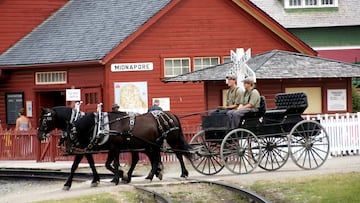Can the Amish vote? The community that can decide the race in Pennsylvania
Could a victory for Donald Trump lie with the Amish community of Pennsylvania? A look at how this community engages with national politics.


One of the US’ most isolated communities is the Amish, and while not a reliable part of either major party’s coalition, some members of the community do vote, particularly in elections where the stakes are high and a change in authority could impact their lifestyle.
Follow live the US elections 2024
Unless you live near one of their settlements, you likely know very little about them (aside from what is shown on dramatized reality television shows). The Amish community is profoundly religious and law-abiding, and they value simple rural life rather than being dependent on modern-day technology. While they are not strictly anti-technology, the Amish will not automatically embrace new technology as a matter of course. Their philosophy is that there are two kingdoms – a material and a spiritual kingdom, the latter being the one whose laws they obey. Interaction with the material world is limited, and historically, they have abstained from engaging with political issues or casting their vote in presidential elections, although that is slowly changing.
The Amish population, primarily residing in Pennsylvania and Ohio, is approximately 373,620. In 2020, President Biden won Pennsylvania by just over 80,000 votes, prompting both political campaigns to focus on securing as many votes as possible in the state. This sizable population has the potential to sway election outcomes, leading to increased outreach efforts to these communities. The Republican Party has been actively engaging with the Amish through canvassing and placing billboards in Lancaster County, where the highest concentration of Amish people live.
- Who is behind the fake video of alleged voter fraud in Georgia?
- US presidential election in 1800: The bizarre outcome between Jefferson and Adams that ended in a duel
- These are the biggest possible Social Security benefits for retirees at ages 62, 66, and 70 in 2025
- The billion-dollar sum of money Donald Trump has lost in October on DJT stock
Could the Amish be a key to a Trump or Harris victory?
Neither campaign should count on it, with only around ten percent of the Amish community casting a ballot in recent general elections. The Amish choose to live in a way that isolates them from local, state, and national politics. This doesn’t mean members of the community never vote, but researchers have found that their participation levels are much lower than the national average. Though many Amish people live lives that do not require them to interact with modern technology, one common exception is business. A website where three Amish families sell handwoven baskets explains the relationship the community has with state and national politics still impacts the communities, “but it’s to a much lesser degree than other cultural groups” because of their isolated lifestyles.
The politics of the Amish could be classified as “small c conservatives,” not to be confused with the Republican party. Many Amish communities attempt to limit the influence of modernity on their lives, leading their conservatism to be based on valuing the past and the lifestyles that previous generations of Amish people have enjoyed. For example, though part of their religious teaching encourages modesty in dress, the religion also teaches a practice of non-violence focused on pacifism that does not align much with the politics of the Republican party.
Small ‘C’ conservatism
Understanding conservatism as a political view rather than as one associated with the Republican party is critical. Many Republicans consider themselves conservative because they value tradition and oppose certain social and political movements.
Related stories
The Amish may be conservative when it comes to the gender roles of their society, but that does not mean their policies always align with the Republican party.
Though socially conservative, the group has a rather progressive attitude when it comes to the treatment of Indigenous people in the US and the role their ancestors had in the genocide that was inflicted upon tribes in the region early Amish settled. Lancaster Online, an outlet serving the area with the greatest Amish population in the country, published an article about an event held by Amish and Indigenous leaders in 2016 where the two attempted to reconcile the violent history the groups shared. The journalist noticed that “both groups shed tears” as a local Amish bishop asked for forgiveness “for the wrong we did.” Though the Amish did not fight the Indigenous people, they displaced certain tribes, and leaders acknowledged that their ancestors did not do enough as deprivation took hold in Indigenous communities. The two communities spoke to their shared values, and one native representative, Shelia Hansen, described how the apology “raised the bar for this country, for all humanity, [and] for forgiveness.”
Complete your personal details to comment